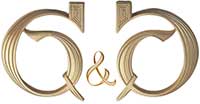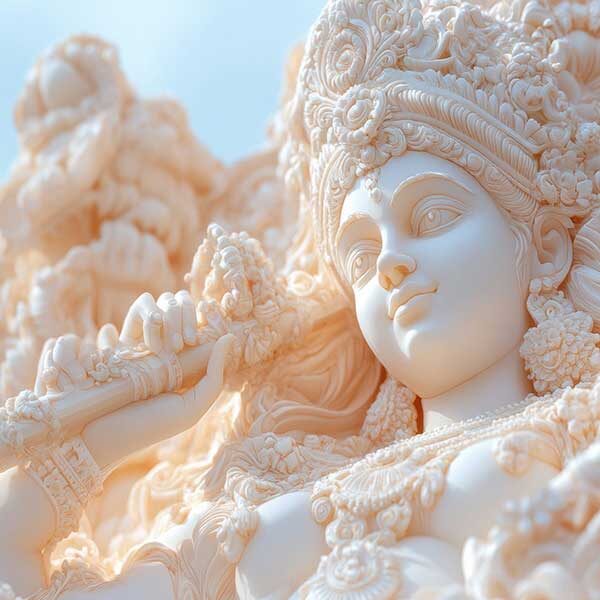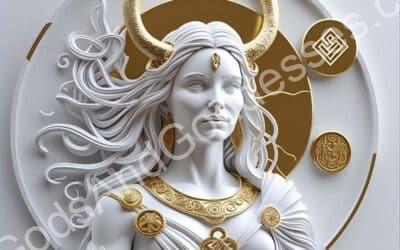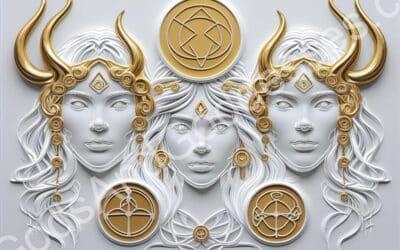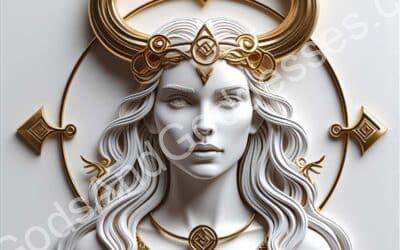Receive Our Newsletter
Resources and reminders to
live your Divine Destiny™
Introduction: The Sacred Feminine in Norse Mythology
Norse goddesses reveal a culture deeply attuned to both the harshness and beauty of life; their stories, recorded in the Poetic Edda and Prose Edda, show that the divine feminine was central to Viking spirituality and myth.
At GodsAndGoddesses.com, we explore how Norse goddesses embody themes of sovereignty, magic, fertility, and fate. In the frozen northlands of the Vikings, goddesses held power equal to the gods, shaping fate, guiding families, and inspiring warriors. From the radiant Freyja, goddess of love and magic, to the wise Frigg, queen of Asgard, and the mysterious Norns, weavers of destiny itself,
“To speak of Norse goddesses is to speak of strength and wisdom woven into the fabric of fate.”
Key Takeaways About Norse Goddesses
-
Norse goddesses include figures of love, family, war, wisdom, and fate, showing the balance of the feminine in Viking myth.
-
They appear in the Eddas and sagas, central texts of Norse mythology.
-
Famous figures include Freyja, Frigg, and the Norns, each tied to destiny, fertility, or family.
-
Their influence continues today in modern spirituality, literature, and even popular culture.
See also: Goddess Types.
Explore Norse Goddess Stories
-
Freyja: Norse Goddess of Love, War, and Magic → Beloved goddess of beauty, passion, and seiðr (magic).
-
The Norns: Norse Goddesses of Fate and Destiny → Weavers of the past, present, and future.
-
Frigg: Norse Goddess of Family, Foresight, and Wisdom → Queen of Asgard, protector of marriage and mothers.
The Role of Norse Goddesses in Myth and Culture
Norse goddesses reveal the values of Viking society—fierce independence, loyalty to kin, reverence for fate, and trust in the cycles of life and death. Unlike distant figures, they were woven into every part of life, from the hearth to the battlefield.
Their myths endure because they express universal themes: love and loss, destiny and choice, magic and mortality. They remind us that power is not only brute strength—it is also foresight, creativity, and resilience.
If Norse goddesses inspire you, you may also want to explore the wider realms of goddesses, gods, and mythology, where their stories continue to shape our understanding of the sacred.
Who Are the Norse Goddesses
The Norse goddesses, or ásynjur (singular: ásynja), belong to the two great families of Norse deities:
-
Æsir – The gods of Asgard, linked to war, kingship, and order.
-
Vanir – The gods of fertility, prosperity, and the natural world.
Many goddesses married across these families, bridging the two divine tribes after their mythical war.
Key Norse Goddesses
Freyja
-
Domains: Love, fertility, war, magic (seiðr)
-
Symbols: Cats, boar (Hildisvíni), necklace Brísingamen
-
Legacy: One of the most venerated Norse goddesses. She wept golden tears for her lost husband Óðr and received half the slain warriors in her hall, Fólkvangr.
See also: Freyja.
Frigg
-
Domains: Marriage, family, foresight
-
Symbols: Spinning wheel, keys, weaving loom
-
Legacy: Queen of Asgard and wife of Odin, Frigg is associated with prophecy, weaving fate, and domestic guardianship. She knows the destiny of all beings but speaks little of it.
See: Frigg.
The Norns
-
Domains: Fate, destiny, time
-
Symbols: Weaving loom, runes, the roots of Yggdrasil
-
Legacy: The three Norns—Urd (Past), Verdandi (Present), and Skuld (Future)—weave the fates of gods and humans alike at the base of the World Tree.
See more at: The Norns.
Sif
-
Domains: Fertility, earth, family
-
Symbols: Golden hair (crafted by dwarves after Loki cut off her original hair)
-
Legacy: Wife of Thor, Sif is linked to fertility and the harvest. Her golden hair symbolizes the fields of wheat.
Skadi
-
Domains: Winter, hunting, mountain
-
Symbols: Skis, bow and arrow
-
Legacy: A giantess who became a goddess after marrying into the Æsir. Associated with independence and the harsh beauty of winter.
Idunn
-
Domains: Youth, immortality
-
Symbols: Apples of eternal youth
-
Legacy: Keeper of the golden apples that keep the gods young. When kidnapped by the giant Thjazi, the gods aged until she was rescued.
Hel
-
Domains: Death, the underworld
-
Symbols: Half-living, half-dead visage
-
Legacy: Daughter of Loki, Hel rules over the dead who do not die in battle. Her realm is Helheim, a neutral underworld, not a place of punishment but of rest.
Archetypes of Norse Goddesses
-
The Lover and Warrior – Freyja combines sexuality with battle ferocity.
-
The Wise Queen – Frigg symbolizes foresight, authority, and domestic order.
-
The Fates – The Norns embody time and inevitability.
-
The Wild Huntress – Skadi represents independence and winter’s might.
-
The Keeper of Youth – Idunn’s apples keep life renewed.
-
The Dark Queen – Hel represents mortality, endings, and balance.
See more: Goddess Types.
Symbols and Worship of Norse Goddesses
Unlike temple-based traditions, Norse worship was rooted in nature and ritual practice:
-
Sacred groves and rivers – Sites where offerings were left.
-
Seasonal festivals – Freyja and Frigg linked to fertility rites and seasonal changes.
-
Magic (Seiðr) – Freyja was the mistress of seiðr, a shamanic magic of fate-weaving and vision.
Modern pagans still honor Norse goddesses through rituals, meditations, and seasonal celebrations.
See more at: Goddess Worship and Rituals.
Norse Goddesses in Myth
-
The Death of Baldr – Frigg foresaw her son’s death, yet fate could not be avoided.
-
The Apples of Idunn – Her capture aged the gods until Loki tricked Thjazi into her release.
-
The Marriage of Skadi – She chose Njord as a husband by looking only at his feet, leading to a mismatched union of mountain and sea.
-
The Hall of Freyja – Fólkvangr, her hall, received half the slain, rivaling Odin’s Valhalla.
Norse Goddesses in Modern Culture
Today, Norse goddesses appear in:
-
Fantasy literature and comics – Freyja, Frigg, and Hel often reimagined in modern stories.
-
Neo-pagan traditions – Worshiped as archetypes of love, war, and fate.
-
Popular culture – Featured in Marvel films, novels, and games, though often simplified versions of their complex myths.
External resource: Britannica – Norse Mythology.
FAQs About Norse Goddesses
Who is the most famous Norse goddess?
Freyja is the most widely recognized, ruling over love, war, and magic.
Are the Norns goddesses?
Yes, they are powerful fate deities central to Norse cosmology.
Did the Norse goddesses fight in battle?
Freyja received warriors in her hall and was linked to Valkyries, suggesting both warrior and lover roles.
Do people still honor Norse goddesses today?
Yes, in Ásatrú and neo-pagan practices worldwide.

Conclusion
Norse goddesses are not passive figures but powerful forces shaping fate, love, sovereignty, and death. From Freyja’s fiery heart to Hel’s cold domain, they embody the full range of divine femininity in Norse myth.
Explore further:
“The ásynjur remind us that fate, love, and death are not separate—they are woven together at the roots of Yggdrasil.”
Posts About Norse Goddesses
Frigg: Norse Goddess of Family, Foresight, and Wisdom
Introduction: Why Frigg Matters In the halls of Asgard, one figure holds quiet but commanding power: Frigg, queen of the Æsir, wife of Odin, and mother of Baldr. She is a goddess of marriage,...
The Norns: Norse Goddesses of Fate and Destiny
Introduction: Why the Norns Matter At the roots of the great World Tree, Yggdrasil, three powerful women sit in silence, weaving the threads of all life; these are the Norns—the goddesses of fate in...
Freyja: Norse Goddess of Love, War, and Magic
Introduction: Why Freyja Matters Among the deities of Norse mythology, none is as complex or compelling as Freyja; she is simultaneously a goddess of love and beauty, a fierce chooser of the slain...
Ingrid Elfver
Ingrid Elfver is a mystic guide, brand strategist, and artist who’s spent more than two decades empowering people of all walks of life. Ingrid is most known for helping high-achieving leaders—including celebrities, thought leaders, entrepreneurs, and executives—to get more in touch with their inner divinity and embody it, so they can live their highest and most fulfilling purpose.
Drawing upon her own spiritual awakening, Ingrid is passionate about cultivating authentic leadership, soulful self-expression, and a meaningful legacy. Renowned for her unique blend of spiritual wisdom and practical tools for transformation, Ingrid has helped countless men and women of all ages align with their true purpose, transcend limitations, and confidently step into their GOD/DESS essence.
Ingrid has been interviewed by Entertainment Tonight, In Touch Weekly, The Bleacher Report, etc. She’s been recognized by the Beverly Hills Chamber of Commerce and the Major of L.A. for her leadership and accomplishments. And she was honored with a “Phenomenal Woman Award” at an event co-hosted by Kathy Ireland as an example of what it means to be “powerful, inspired, brilliant, visionary and bold.”
Entrepreneur.com put Ingrid on their “Top 10 Twitter Feeds for Inspiration” with Tony Robbins and Paulo Coelho.
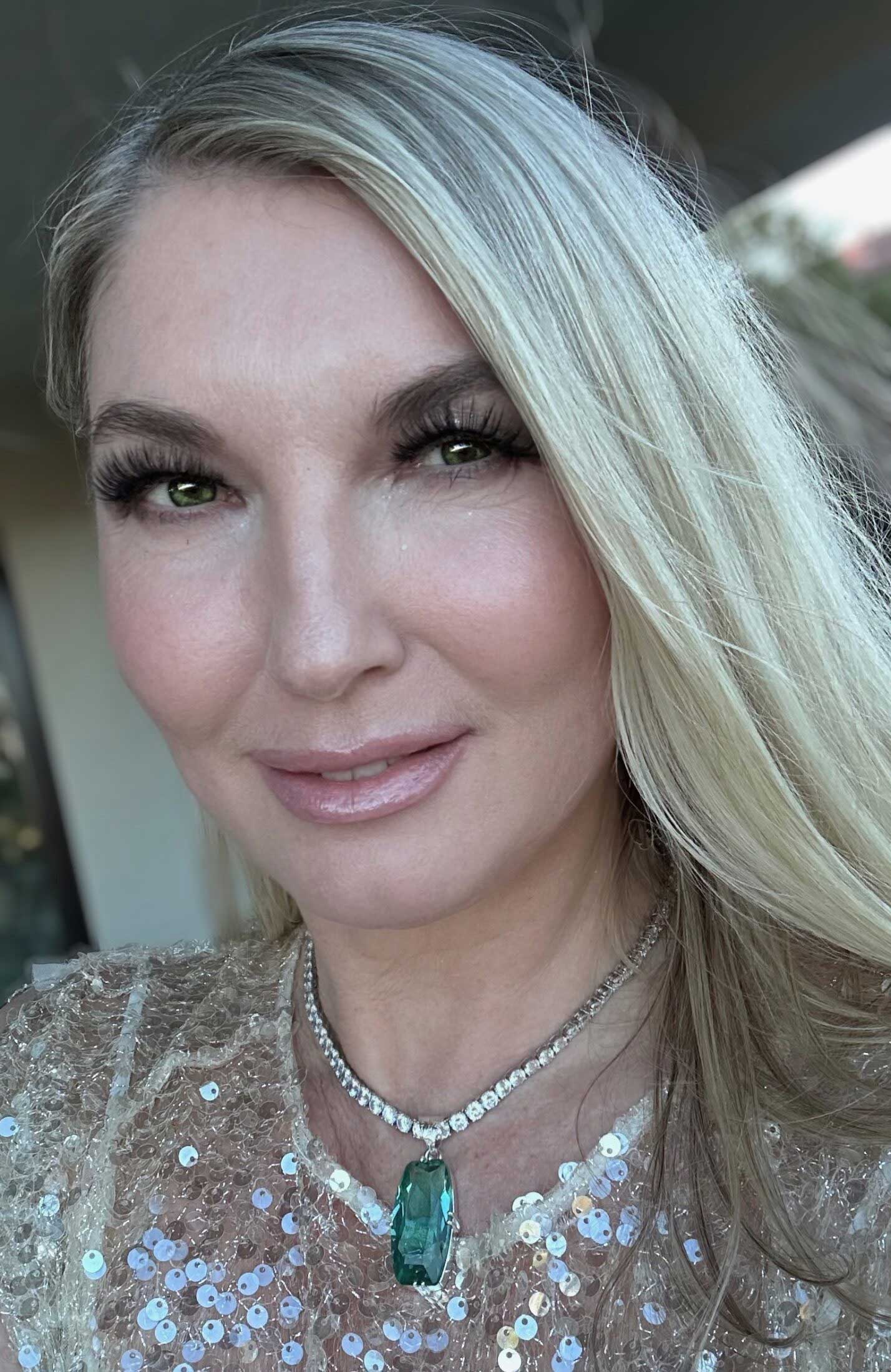
Discovery Call
Ingrid Elfver
Ingrid Elfver is a mystic guide, brand strategist, and artist who’s spent more than two decades empowering people of all walks of life. Ingrid is most known for helping high-achieving leaders—including celebrities, thought leaders, entrepreneurs, and executives—to get more in touch with their inner divinity and embody it, so they can live their highest and most fulfilling purpose.
Drawing upon her own spiritual awakening, Ingrid is passionate about cultivating authentic leadership, soulful self-expression, and a meaningful legacy. Renowned for her unique blend of spiritual wisdom and practical tools for transformation, Ingrid has helped countless men and women of all ages align with their true purpose, transcend limitations, and confidently step into their GOD/DESS essence.
Ingrid has been interviewed by Entertainment Tonight, In Touch Weekly, The Bleacher Report, etc. She’s been recognized by the Beverly Hills Chamber of Commerce and the Major of L.A. for her leadership and accomplishments. And she was honored with a “Phenomenal Woman Award” at an event co-hosted by Kathy Ireland as an example of what it means to be “powerful, inspired, brilliant, visionary and bold.”
Entrepreneur.com put Ingrid on their “Top 10 Twitter Feeds for Inspiration” with Tony Robbins and Paulo Coelho.

Discovery Call
- Odin God Story - August 24, 2025
- The Story of Ra: Egyptian Sun God and Creator - August 24, 2025
- Kraken: Mythological Sea Monster of the Deep - August 24, 2025
